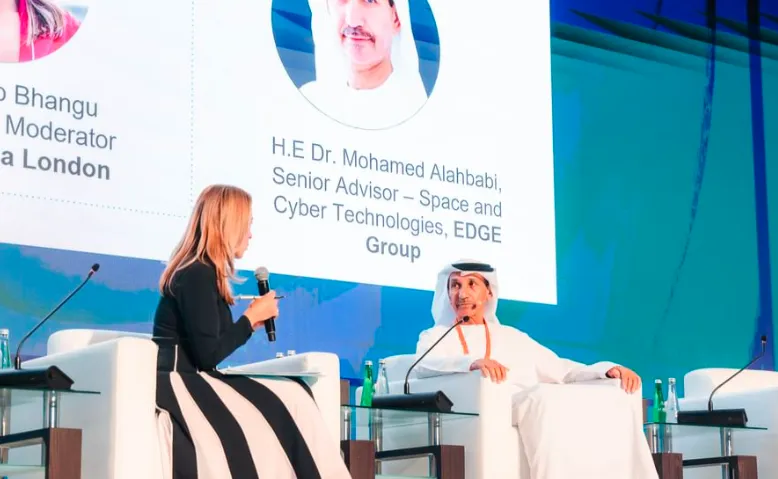The Global Aerospace Summit (GAS) 2024 commenced today in Abu Dhabi, bringing together the foremost leaders from the aerospace, aviation, and defence sectors. This premier forum’s seventh edition is shaping the future of these industries, driving high-level discussions around sustainability, innovation, and talent development—critical components for ensuring long-term global growth.
The opening of the summit featured a pivotal panel discussion on ‘Developing the nation’s defence industry system,’ where Dr Mohamed Alahbabi, Senior Advisor & Space Lead at EDGE Group, alongside global leaders in the sector, shared insights into strategic innovation, smart manufacturing, and the importance of international partnerships in bolstering the UAE’s defence capabilities.
Dr Alahbabi emphasised the UAE’s strategic investments in space and aerospace: “The UAE continues to invest heavily in these sectors. The growth trajectory will continue with more satellites entering orbit, new companies being established, and greater investments in human capital. Space is fundamental to the advancement of science, innovation, and defence. We take pride in the UAE’s unparalleled achievements in these industries.”
A keynote delivered by Salem Humaid Al Marri, Director General of the Mohammed Bin Rashid Space Centre (MBRSC), marked a significant moment for the UAE’s space sector. He celebrated the achievements of the UAE National Space Programme, coinciding with the fifth anniversary of Dr Sultan Al Neyadi’s first space mission. Al Marri underscored the nation’s commitment to positioning itself as a global leader in space exploration: “Through space exploration, we are realising the vision of the UAE, contributing to national development and creating high-tech jobs. Space technologies have profoundly transformed our world, and today, they are undoubtedly an essential part of our daily lives, not a luxury.”
Saudi Arabia’s Aviation Transformation
Saudi Arabia’s aviation sector remains a key focus for the region’s growth. Ali Rajab, Executive Vice President of GACA and Board Member of the Saudi Air Connectivity Programme, provided significant updates on Saudi air connectivity and its role in advancing the country’s strategic goals. Discussions also centred on Saudi Arabia’s transformation, during the panel ‘Offering insights into the future of the Saudi Arabian Aviation sector’ with leaders such as Osamah Alnuasier, SVP of Marketing and Corporate Communications at Riyadh Air, and Grainne van den Berg, Head of Airline Marketing Middle East and North Africa at Airbus, outlining ambitious plans for the future.
Van Den Berg highlighted Airbus’s pivotal role in supporting Saudi Arabia’s aviation ambitions: “The Kingdom’s aviation sector is undergoing unprecedented growth, and Airbus is proud to support this transformation through sustainable aircraft innovations. Our strategic partnerships are driving the modernisation of fleets and supporting the ambitious goals of Vision 2030.”
Technological innovation remains central to the discussions and these were discussed during the panel titled ‘Technological advancements and disruptions in the regional and international aerospace landscape.’ During this discussion, Josef Mouris, CEO of Electron Aerospace, addressed the evolving challenges faced by the aviation sector, including the increasing impact of CO2 charges. Mouris noted, “Adapting our strategic thinking is paramount as we move forward. The industry will see more small aircraft and retrofitted planes enter the market, designed to meet existing regulatory and sustainability standards.”
The conversation also touched upon research and development in the industry. Speaking on the panel titled ‘What is next for R&D in Aerospace?’ Sharief Fahmy, Executive Director at KAMAN said “There’s no better environment than the ecosystem that’s been established here in the Middle East, and more specifically, in UAE and Abu Dhabi. I’ve been part of the community for 16 years now, and to see how fast we’ve come along in a very short period of time, it all has to do with the fact that you are in an environment that really promotes talent and development.”
In a special interview on stage, Antonoaldo Neves, Group CEO of Etihad Airways, reinforced Etihad’s leadership in shaping Abu Dhabi’s aviation landscape. Neves elaborated on the airline’s strategic focus on expanding its network, increasing passenger numbers, and driving talent development, particularly among Emiratis. “Etihad remains at the forefront of the UAE’s aviation sector, working towards expanding both our network and our workforce. We are committed to building long-term careers for Emiratis, from cadet pilots to senior executives, and continuing our reputation for exceptional service,” said Neves.
As the summit progresses, discussions will deepen around international partnerships, space domain awareness, and the integration of space communications with Earth observation technologies. The UAE continues to solidify its position as a global hub for aerospace, space exploration, and technological innovation, with the GAS 2024 serving as a key platform for shaping the future of these sectors.

